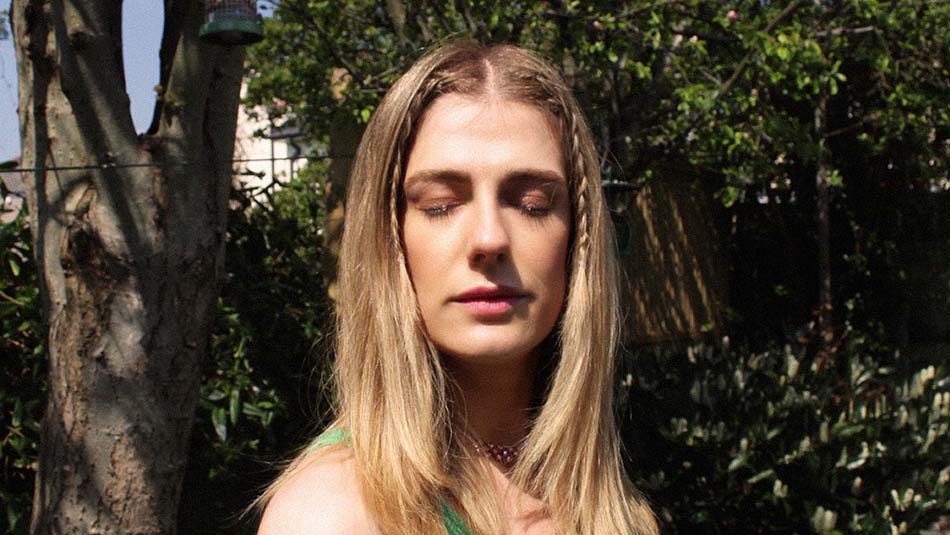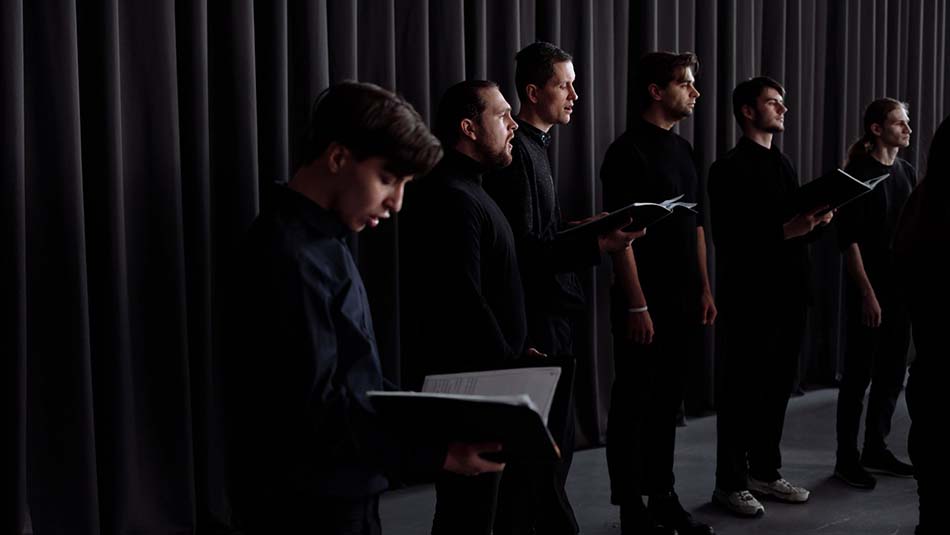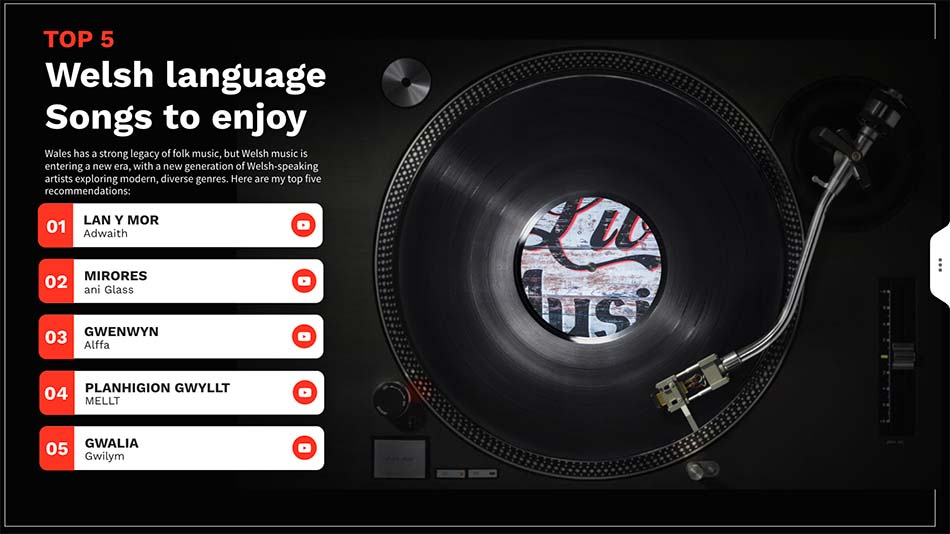A local Welsh musician has gone viral on Tiktok for rapping drill music in the Welsh language. As more alternative and quirky genres of music are being sung in Welsh, will this spark interest in people to start learning the language?

Ani Glass walks over the beach with a white veil above her head, the sun shining brightly as nature and her work in harmony, empowering her to reach freedom. Her music video ‘Mirores’, a dreamy and kaleidoscopic scene of gentle, ethereal textures combined with deeply saturated synth-beats, displays a fusion of modern electronic music with the soft, lyrical tone of the Welsh language.
Welsh music was still largely classical and folk for the electro-pop musician at the start of her career, with few opportunities for artists to experiment with other musical genres and attract a wider audience. Ani wanted to use her expanding platform to give a new audience to the Welsh language and said: “There’s lots of amazing Welsh language music, but when I was making Welsh music at the time, there wasn’t the kind of music that I liked, so I started making electro-pop music and it just developed from there.”
Nothing is off-limits to the new, passionate wave of Welsh-speaking musicians, as the modern Welsh music scene is prospering, with a diverse range of genres such as rock, jazz, punk, drill, rap and hip-hop, to appreciate. Most recently, a 22-year-old student called Toda Ogunbanwo, who performs under the stage name Sage Todz, went viral on social media for a video of him rapping drill music in the Welsh language.
Ani Glass, an electronic pop musician, producer, and artist, sings in her native languages Welsh and Cornish. After relocating from England to her birthplace of Cardiff, Ani began working on music that, while very nostalgic, took on a very different tone than traditional Welsh music.
“You still get it sometimes, more from radio and press, who might want to lump you in as the Welsh language act instead of what kind of music you are,” said Ani, noting that while Welsh music was moving away from being considered a single genre, there should be more emphasis on the style of music artists make.
“It happens less, but often Welsh language music is classed as a genre. There is electronic, folk music, rock, pop – there’s all sorts, so it’s nice when you get put on a bill alongside music that makes sense to your kind of music and not just because you’re speaking the same language.”

As more Welsh-speaking musicians thrive, it represents a significant advancement from the late 1990s’ ‘Cool Cymru’ phenomenon, which included bands such as Stereophonics and Super Furry Animals, and while these artists helped put Welsh music on the map, the majority of their songs were in English. Yet, a new generation of Welsh language music has the potential to prosper on a global scale.
You listen to the music and that helps because it’s not just about the words, it’s about the culture.
ANI GLASS, ELECTRO-POP SINGER
“It’s definitely growing, there weren’t many girls doing things by themselves, especially electronic music when I started but there’s definitely loads more now. I think the younger generation are far more competent and confident in what they want to do,” said Ani. “People seem more switched on, more focused and they have a stronger sense of identity. I think the future is in good hands if the younger people can grow momentum and get on that Welsh language train.”
According to Ani, Welsh music is assisting younger people in learning more about the culture and encouraging them to start learning the language. “You listen to the music and that helps because it’s not just about the words, it’s about the culture. If people want to come to Wales or already live in Wales, the easiest way to feel part of the community is to become involved in the culture and… music is just one aspect of that which I think is really helpful.”
Steffan Dafydd, frontman of Breichiau Hir and marketing manager of Clwb Ifor Bach, a renowned Cardiff venue, believes that music is becoming more inclusive, enabling young people to listen to a variety of genres. “I don’t meet many people who only like one or two genres of music anymore…I think it is because music from all over the world has become more accessible and in turn, people are much more open to hear different things.”
“For me, whenever something that blows my mind in a language I don’t understand, I research the song, the artist, the context of the song and the country the artist comes from,” said Steffan. “So, I suppose that learning the language is a huge step towards understanding more about the songs and their context.”
The Welsh government published a programme called Cymraeg 2050, the national strategy to reach one million Welsh speakers by 2050. This is already transpiring, as Welsh has become the fastest-growing language in the UK, which predicts will have a 44% increase in users each year, according to the language-learning app and research company Duolingo.
For MELLT’s guitarist and vocalist Glyn Rhys-James, one of the most enjoyable aspects of being part of a Welsh band is inspiring other people to start learning the Welsh language. “I love it every time someone has come up to me and said listening to your music has made me want to learn Welsh, and to help with the cause of helping get a million Welsh speakers, it makes it feel very fulfilling and it’s a good feeling to know that something you’ve done has helped the language that has ultimately done so much for us.”
Glyn Rhys-James and Ellis Walker say that the support for their music has been unmatched, especially from Cardiff. “it’s been quite wild here and there’s great support in Cardiff, whether its Welsh language speakers or not…they are quite welcoming in the Welsh scene for new bands,” said Glyn.
“We always thought we would sing in Welsh…this is the most natural language for us to write in. We liked our songs and even when we were eleven, it did quite well,” said Glyn, reminiscing on the early days of them producing Welsh music. “It got played lots on the radio and on the telly, so I think the Welsh language has always been an attractive language for us to write in because there are so many opportunities there.”
The three-piece punk rock band burst onto the Welsh music scene back in 2012, coming from the beautiful shores of Aberystwyth before moving to Cardiff. In 2018, the Welsh trio took home the trophy for the Welsh Language Album of the Year at the annual National Eisteddfod of Wales.
“I think there is a big misconception of speaking Welsh and people who are learning, especially if you are speaking to someone who is incredibly fluent and you feel like you don’t want to speak in Welsh because you feel like you might be judged – I’ve heard that so many times from different people,” said Ellis, who thinks Welsh music helps encourage people to start learning the language. “For me, the fact that people try is the best thing about it. It doesn’t matter how well you speak it.”
It’s a good time to be writing and singing in Welsh, but I think there could be more done to push it outside of Wales.
Ellis Walker, VOCALIST FOR THE ROCK BAND MELLT
Ellis recalls how people who grew up in Wales listened to their music and were inspired to begin learning the language again. “People have said that they want to get back into the language, that they learned back in school but never really got into it and then have been like, it’s made me want to pick up Welsh again. It was never our intention when we started singing in Welsh but it’s such a nice benefit of it.”
While Welsh language music has surged in popularity in recent years, Glyn and Ellis believe that more could be done to make it more diverse and inclusive, while also attempting to reach a wider audience. “It’s a good time to be writing and singing in Welsh, but I think there could be more done to push it outside of Wales. I think it is pretty strong within Wales and I think there is scope to get more women involved and people of colour because…it’s quite a white male dominated scene,” said Ellis.
Welsh-speaking musicians are creating some of the most fascinating and creative music of the time, but there is no denying that there is still a long way to go. Steffan says that Welsh music should not be classified as a single genre: “One of the great things about going to Welsh shows back in the 2000s when I was growing up was that the line ups were so varied genre-wise, because you had artists doing really different things, but they were tied in together by the fact that they sung in Welsh.”

